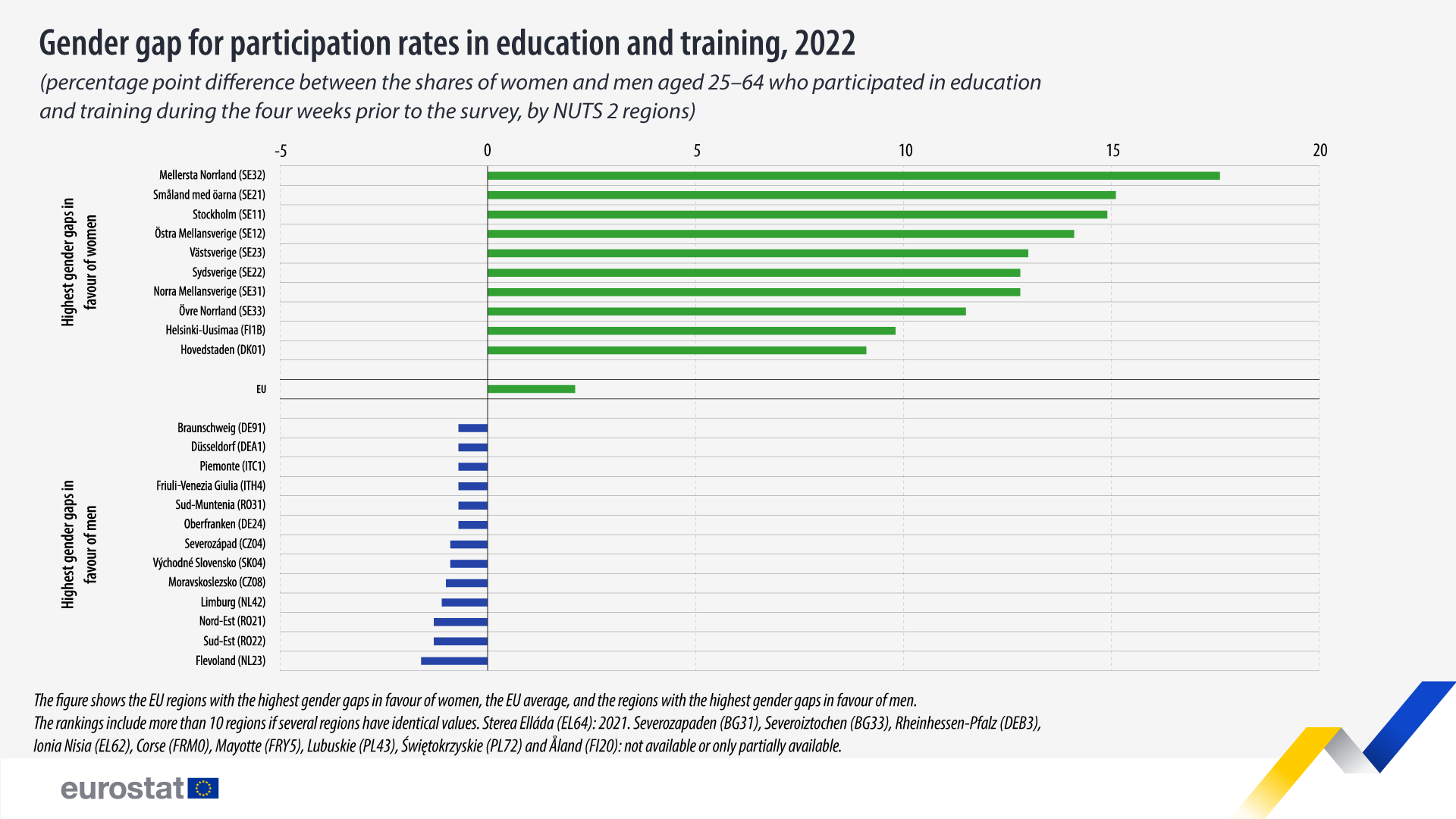Adults in education and training across EU regions
The distribution of adult participation rates in formal and non-formal learning during the last 4 weeks at the regional level (NUTS 2 regions) tends to be very homogeneous within EU countries, reflecting national rather than regional education and training initiatives.
In 2022, 96 out of 240 regions had participation rates equal to or above the EU average of 11.9%. This group included every region of Denmark, Spain, the Netherlands, Austria, Slovenia, Finland and Sweden, as well as Estonia, Luxembourg and Malta (all single regions at this level of detail).
At the top of the list, there were 24 regions where at least one-quarter of people aged 25 - 64 participated in education and training during the four weeks prior to the survey. In 8 regions of Sweden, the participation rates were higher than in any other region in the EU, peaking at 38.1% in the capital region of Stockholm. This group also included all 5 regions of Denmark and 9 out of the 12 regions in the Netherlands, with the highest rates observed in Hovedstaden (the Danish capital region) and Utrecht (the Netherlands). Two other capital regions are on this list: Helsinki-Uusimaa in Finland and Bratislavský kraj in Slovakia.
Source dataset: trng_lfse_04
On the other hand, 29 regions observed participation rates for adult education and training below 5.0% in 2022. This group was concentrated in Bulgaria (all 6 regions), Greece (10 out of 12 regions; no data for Ionia Nisia) and Croatia (3 out of 4 regions), but also included 5 regions in Poland, 3 in Romania, as well as one in Belgium and another in Germany.
Higher participation rates for women in 192 out of 233 NUTS 2 regions
In 2022, 12.9% of women aged 25–64 participated in education and training during the four weeks prior to the survey. This was 2.1 percentage points (pp) higher than the corresponding share recorded for men (10.8 %). Higher participation rates for education and training for women were observed in 192 out of 233 NUTS 2 regions for which data are available. There were 3 regions where the participation rates between the sexes were the same, while the remaining 38 regions had higher participation rates for men.
The higher rates of women participating in education and training were especially pronounced in regions characterised by very high overall participation rates. This was particularly the case for the 8 Swedish regions, where participation of women was 11.5 to 17.6 pp higher than that of men; the largest gap was observed in Mellersta Norrland (17.6 pp). Significantly higher rates were also recorded in the capital regions of two other Nordic EU countries: Helsinki-Uusimaa in Finland (9.8 pp gap) and Hovedstaden in Denmark (9.1 pp).
The regions where adult participation rates in education and training were higher among men were concentrated across Germany (13 regions), Romania (5 regions), Czechia (4 regions), Italy (also 4 regions, principally in the north), Greece and Slovakia (both with 3 regions).
Source dataset: trng_lfse_04
This information is present in the 2023 edition of Eurostat's regional yearbook, which focuses on the European Year of Skills, designed to support individuals to get the right skills for quality jobs while helping businesses address skills shortages. Extended chapters on education and the labour market gauge how the different regions are faring.
Would you like to know more about education and training in the EU?
You can read more in the dedicated section of the Regions in Europe - 2023 interactive edition and in the dedicated chapter in the Eurostat regional yearbook - 2023 edition, also available as a Statistics Explained article. The corresponding maps in the Statistical Atlas provide a full-screen interactive map.
For more information
- Thematic section on education and training
- Database on education and training
- Thematic section on regions
- Database on regional statistics by NUTS classification
- Digital Education Action Plan (2021–2027) – Resetting education and training for the digital age
- European Education Area – Adult learning initiatives
- The European Pillar of Social Rights Action Plan
Methodological notes
- Formal education and training is defined as “education that is institutionalised, intentional and planned through public organisations and recognised private bodies, and - in their totality - constitute the formal education system of a country. Formal education programmes are thus recognised as such by the relevant national education or equivalent authorities, e.g. any other institution in cooperation with the national or sub-national education authorities. Formal education consists mostly of initial education [...]. Vocational education, special needs education and some parts of adult education are often recognised as being part of the formal education system. Qualifications from formal education are by definition recognised and, therefore, are within the scope of ISCED. Institutionalised education occurs when an organisation provides structured educational arrangements, such as student-teacher relationships and/or interactions, that are specially designed for education and learning”. This definition is based on ISCED 2011.
- Non-formal education and training is defined as “education that is institutionalised, intentional and planned by an education provider. The defining characteristic of non-formal education is that it is an addition, alternative and/or complement to formal education within the process of lifelong learning of individuals. It is often provided in order to guarantee the right of access to education for all. It caters to people of all ages but does not necessarily apply a continuous pathway structure; it may be short in duration and/or low-intensity; and it is typically provided in the form of short courses, workshops or seminars. Non-formal education mostly leads to qualifications that are not recognised as formal or equivalent to formal qualifications by the relevant national or sub-national education authorities or to no qualifications at all. Nevertheless, formal, recognised qualifications may be obtained through exclusive participation in specific non-formal education programmes; this often happens when the non-formal programme completes the competencies obtained in another context”. This definition is based on ISCED 2011.
If you have any queries, please visit our contact us page.

